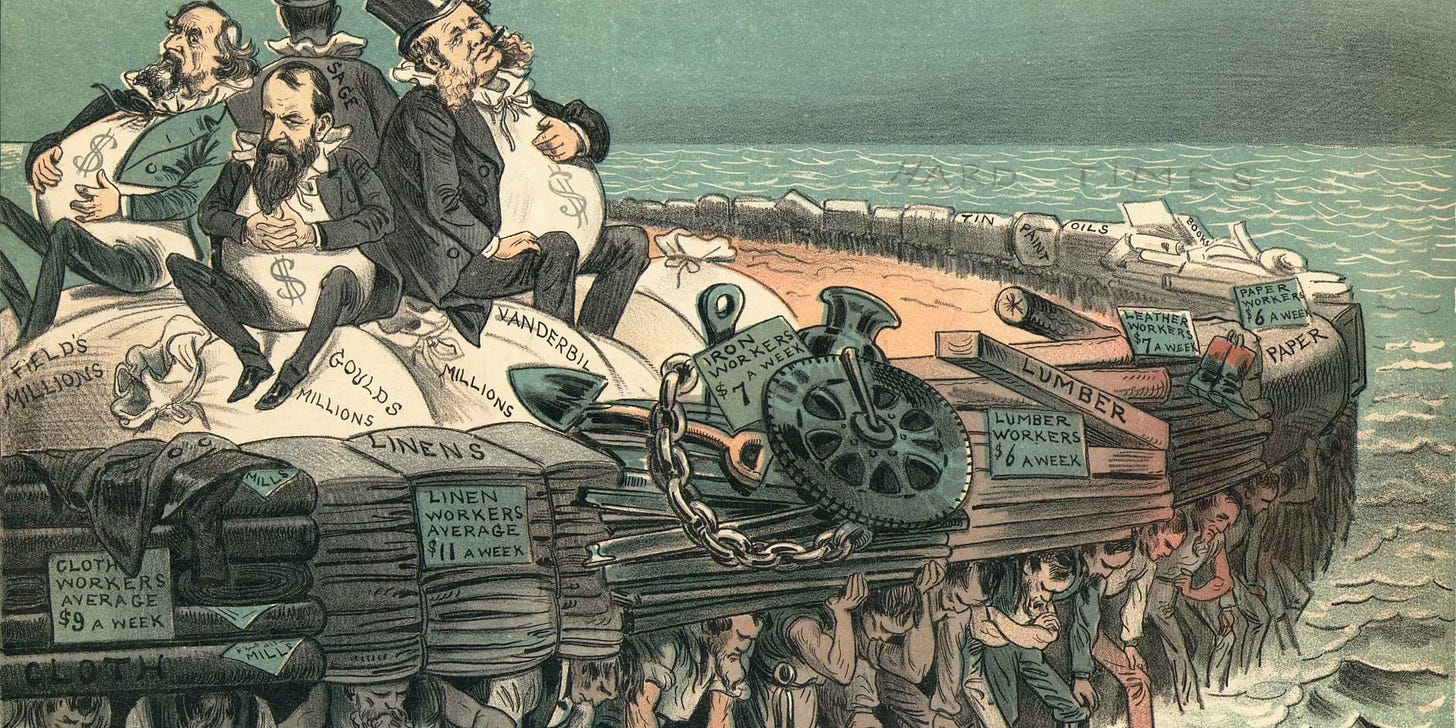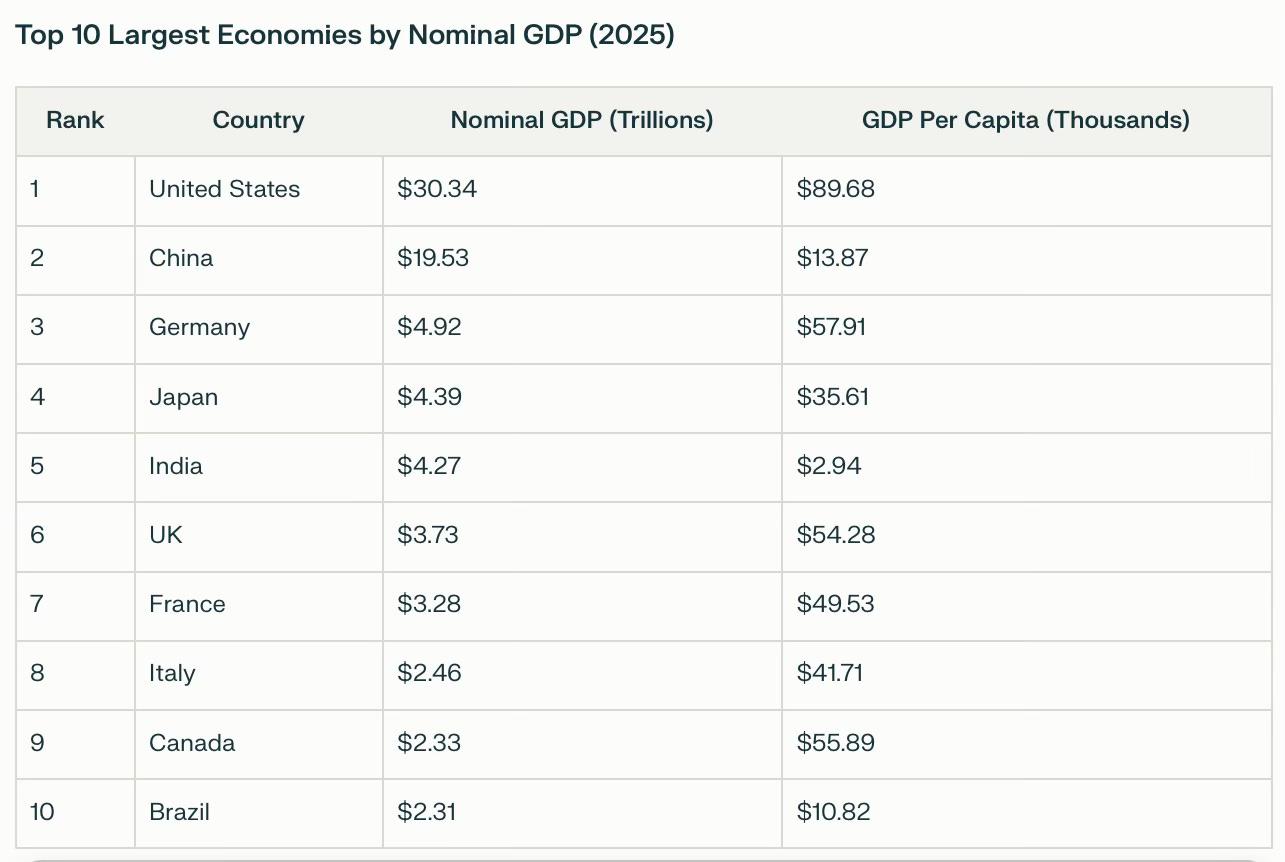America won Peak Globalization but Americans are losing the subsequent Gilded Age
And guess what? Rule by billionaires isn't the answer
Trump keeps trying to sell us on the notion that William McKinley (POTUS, 1897-1901) was a transformational leader because he relied on protectionist tariffs. But the comparison actually extends deeper than that.
McKinley is also remembered for realigning and consolidating the Republican Party’s power, setting the stage for decades of GOP dominance — Trump’s none-too-secret goal with him as permanent kingmaker.
That was not to be in McKinley’s case, as an anarchist assassin killed him early in his second term, shooting him at a public appearance. The power transition to Theodore Roosevelt tipped the country’s trajectory from 19th century conservatism regarding the federal role in the economy to 20th century progressivism that viewed the federal government as a positive fixer of social and economic “ills.” So, while McKinley focused on industrial and territorial expansionism, Roosevelt embraced progressive activism and trust-busting, redefining the presidency to the point where it makes total historical sense that his face is on Mount Rushmore because … like Lincoln, TR saved America from itself.
Teddy spotted the breaking point, and ameliorated the tension — something this country desperately needs right now as we barrel toward more breaking points.
Then there are the territorial ambitions openly expressed: McKinley annexed Hawaii; acquired — by war — the former Spanish colonies of Puerto Rico, Guam, and the Philippines; and projected US power abroad like no president before him. Trump, with his acquisitive talk concerning Greenland, Canada, and the Panama Canal, evokes that McKinley-era vision of rising American greatness and global dominance — you know, where we win every transaction, every deal, every showdown.
Like McKinley, Trump presents himself as a champion of the “common man” against perceived elites and foreign threats, but, unlike McKinley, Trump stacks his cabinet with billionaires who seem desperately — at times hilariously — out of touch with our paycheck-to-paycheck economy.
Trump’s advisors have touted the McKinley comparison as a way to legitimize Trump’s policies and contextualize them as traditional Republican leadership. Trump even signed an executive order renaming Alaska’s Denali back to Mount McKinley. Yay!
Probably the biggest difference between McKinley and Trump is that McKinley, despite his expansionism and old-school conservatism, actually embraced some of the earliest expressions and goals of America’s subsequent Progressive Era, meaning he represented both the high-water mark of pre-modern America while initiating the profound transition to modern America.
America today seems similarly poised at a high-water mark, but not one Trump can navigate.
America’s Gilded Age — roughly from the 1870s into the 1890s — was characterized by rapid industrialization and economic growth, but also by widespread political corruption and immense wealth inequality. Today’s America is characterized by rapid digitalization/automation and — until recently — economic growth, but it likewise features widespread political corruption (how else to describe Trump’s many moneymaking and political extortion schemes?), along with immense wealth inequality.
Back in McKinley’s time, America dominated global manufacturing, accounting for roughly one-quarter and outpacing even imperial Britain. This time around, America dominates global service industries, as China has moved into the #1 position on manufacturing. Trump wants to take America back to such manufacturing dominance, and yet, only 10% of the private sectors jobs in America fall into that category, while more than 80% of jobs today hail from the services sector.
What do these comparisons to the past tell us?
When manufacturing defined globalization, America was big on manufacturing. But, when globalization shifted to services, America went big on that, not just keeping the pace but setting it. Now, with the ongoing digitalization of global trade, we are poised to both shift and maintain our currency in globalization’s evolution.
This is how one stays ahead of the pack and generates preeminent global wealth, which America still enjoys — if unequally within its ranks.
Here’s how things stand globally (from PerplexityAI):
Not much to complain about in the aggregate, is there?
At least not until you drill down on the domestic inequality:
The top one percent own about one-third of the wealth, as does the next tenth (90th to 99th percentile), as does the next 40% (50th to 90th percentile).
That leaves a whopping 3% of household wealth to be split among the bottom half of society.
So, yeah, it is hard to say that America did anything but win, win, and win some more when it came to modern globalization. We just let the bulk of that wealth (two-thirds) concentrate itself at the very top of the economic pyramid (90th percentile and above).
Trump’s answer to this situation? Devastate government services to the non-wealthy and huge tax breaks for the most wealthy — again, overseen by a cabinet of billionaires who know what the “real economy” is all about.
This is the striking paradox of today’s American economy, which has reaped enormous benefits from global economic integration even as many Americans have been truly left behind — mirroring the inequalities and social tensions of the original Gilded Age. Then, as now, America grew wealthier and more powerful, but many Americans feel cheated and marginalize by both the pace of change and the concentration of wealth at the top.
And this is how things stand as Artificial General Intelligence (AGI) and quantum computing are poised to turbo-charge all these trends and imbalances, suggesting a lot of political breaking points lying ahead.
Again, the US has excelled at capturing global economic rewards, but our domestic policy and politics haven’t adequately redistributed those gains or supported those Americans disadvantaged by all this economic upheaval.
Back in the original Gilded Age, unions were far more powerful and thus workers' real wages rose. Today, wages stagnate at best and weaken for most. We are no longer in the business of seeing children out-earn their parents in real wages and wealth accumulation, with a stunning amount of that generational wealth evading transmission to upcoming cohorts because our medical system tends to suck the elderly dry of their wealth before finally letting them die. The so-called Great Wealth Transfer from Boomers to their kids really exists overwhelmingly in that uppermost income tier (or high net worth individuals), while the rest of us see much of that transfer intercepted by the medical industry.
Again, Trump only seems to be making things worst by decimating the government’s social services and programs. Over time, the lack of robust social safety nets, retraining programs, and progressive tax policies will simply exacerbate the sense that "America" is winning, but most "Americans" are not.
Until Trump decided to set the US economy into its current downward spiral, America was continuing to triumph in globalization, mirroring its rise during the Gilded Age — particularly its technological dynamism. Yet, as in the Gilded Age, many Americans have experienced insecurity, inequality, and a sense of being left behind.
Trump’s attempts to recast global trade to our singular advantage simply do not address the true challenges our nation faces. As a corrective, we need another progressive era to match the one triggered back then under (and across) the Roosevelts — Teddy and Franklin. We can’t get there by hollowing out the federal government and letting the Tech Bros buy national elections as they see fit. That’s just the Gilded Age extended, eventually triggering ever more radical responses from the Left while demanding ever more brutal fascism from the Right.
America is not on a politically sustainable path with Trump. We are headed toward ever-greater political danger and unrest.
The Boomer generation entered US politics as this hugely disruptive force, and, apparently, they’re going to exit US politics in the same highly divisive manner.
”









